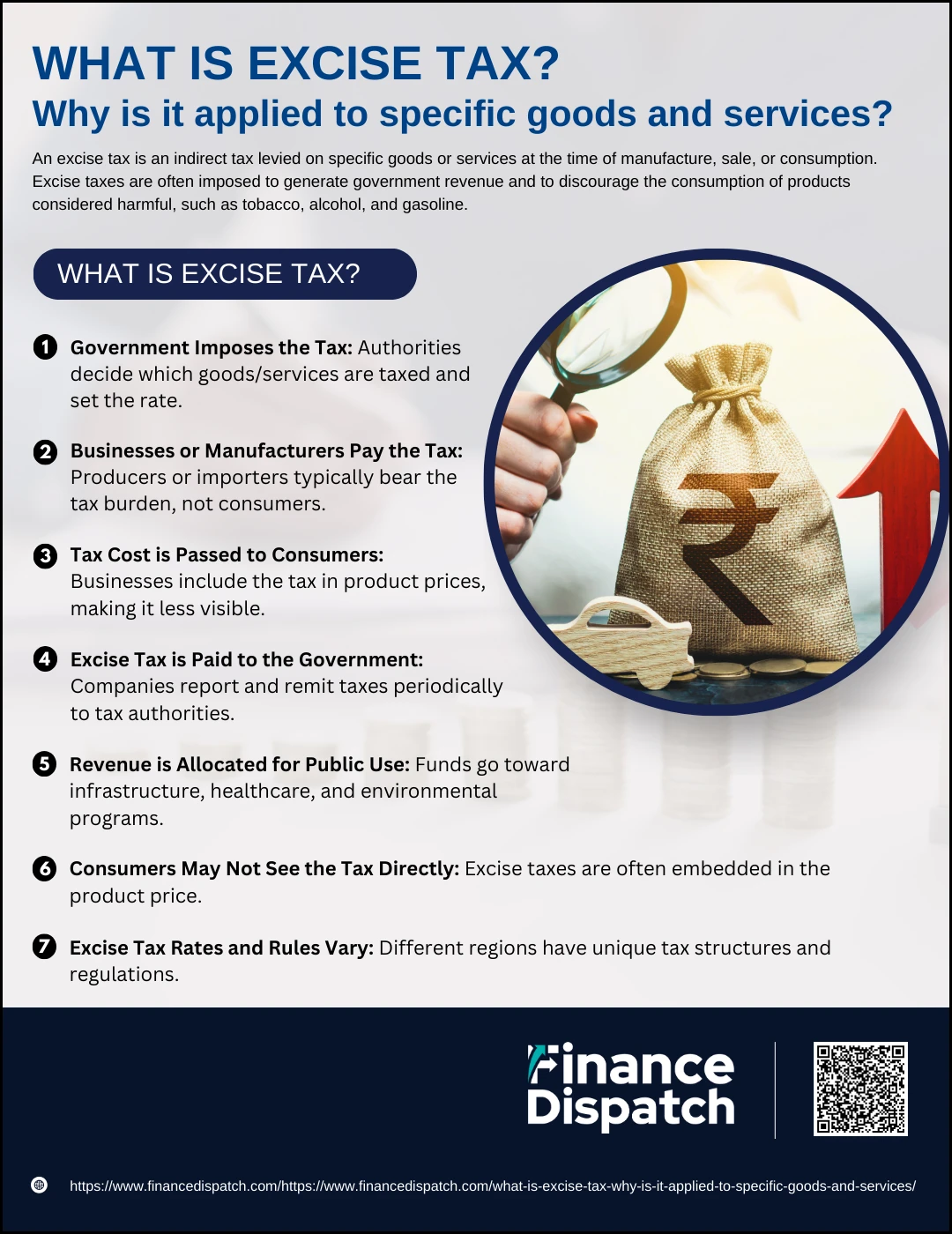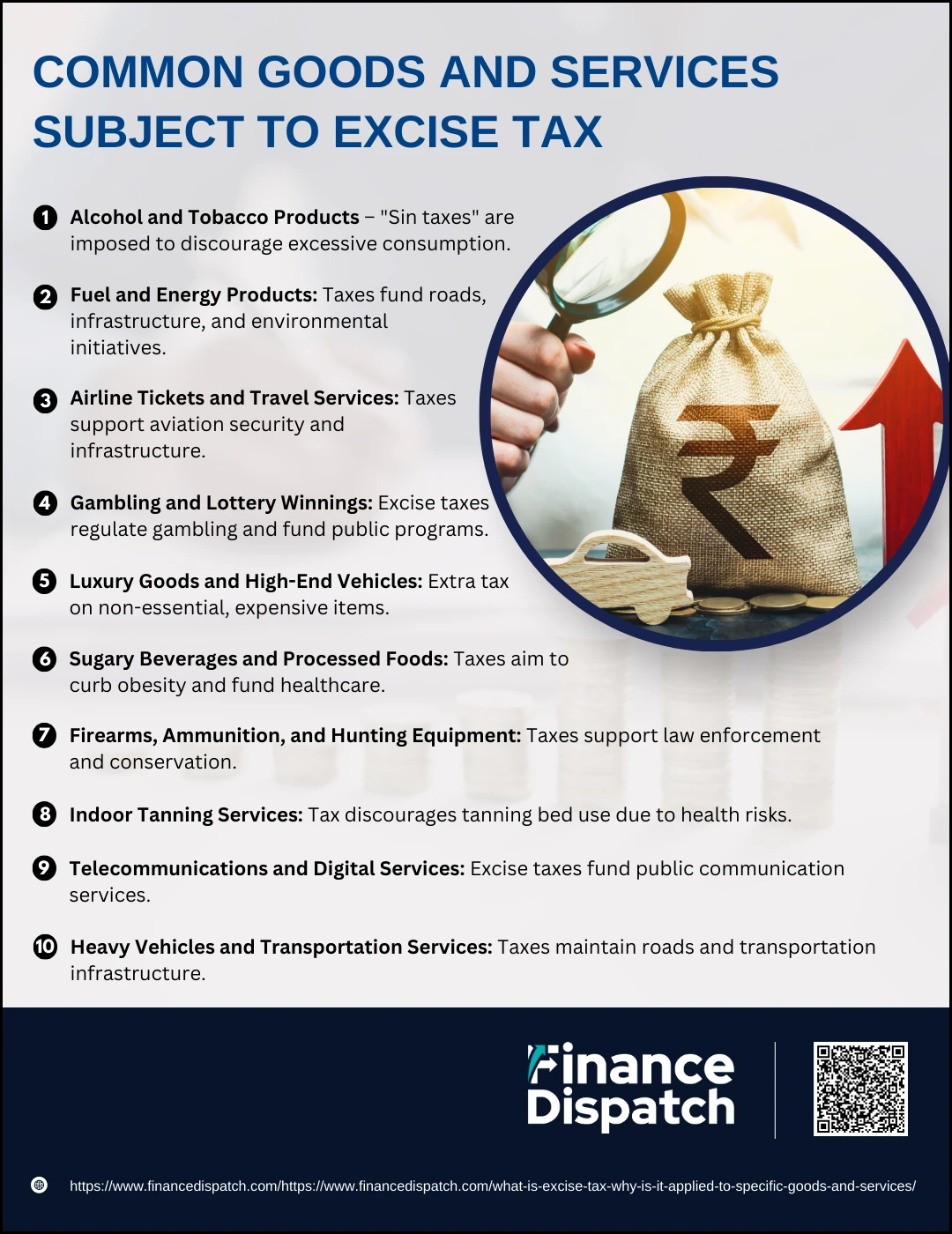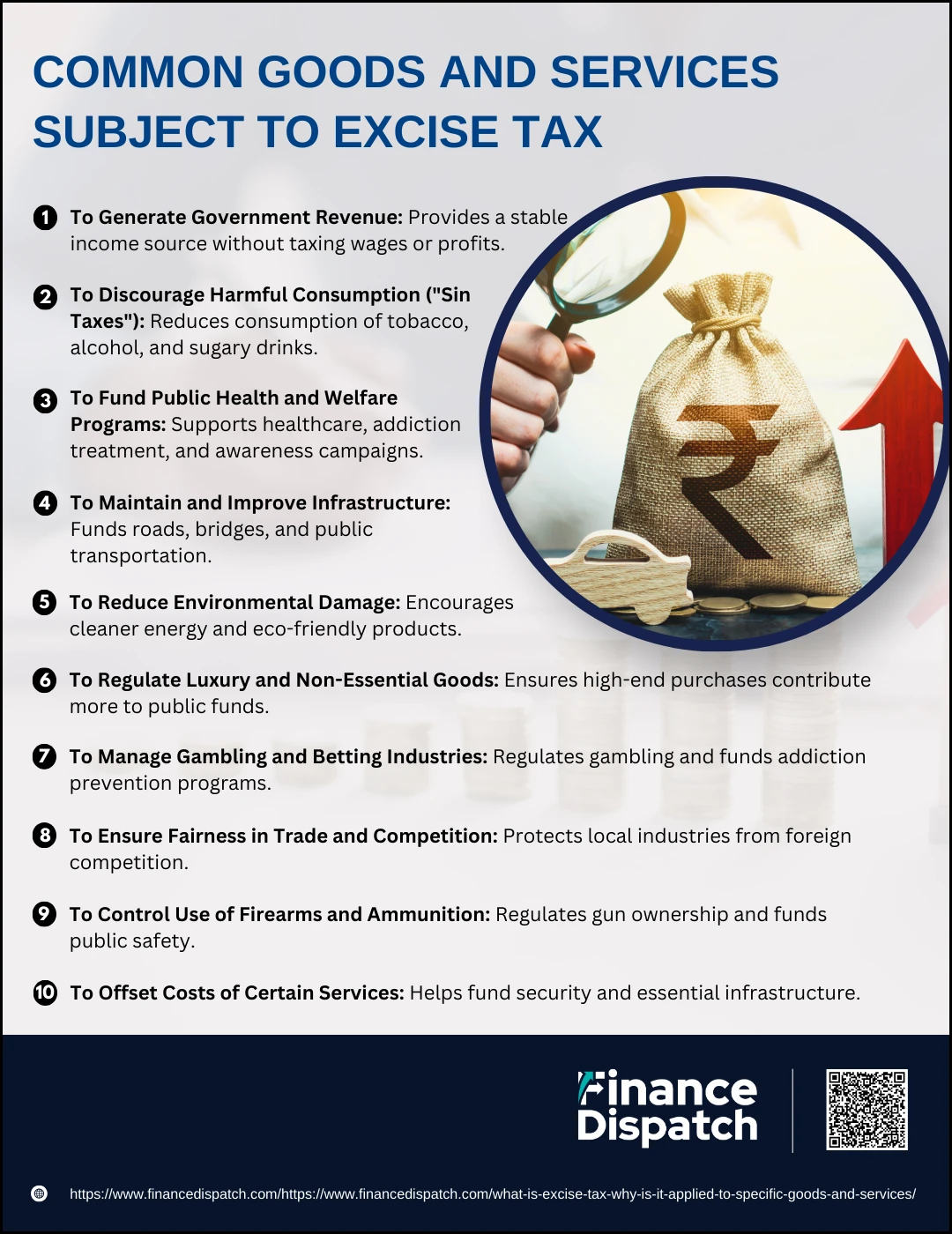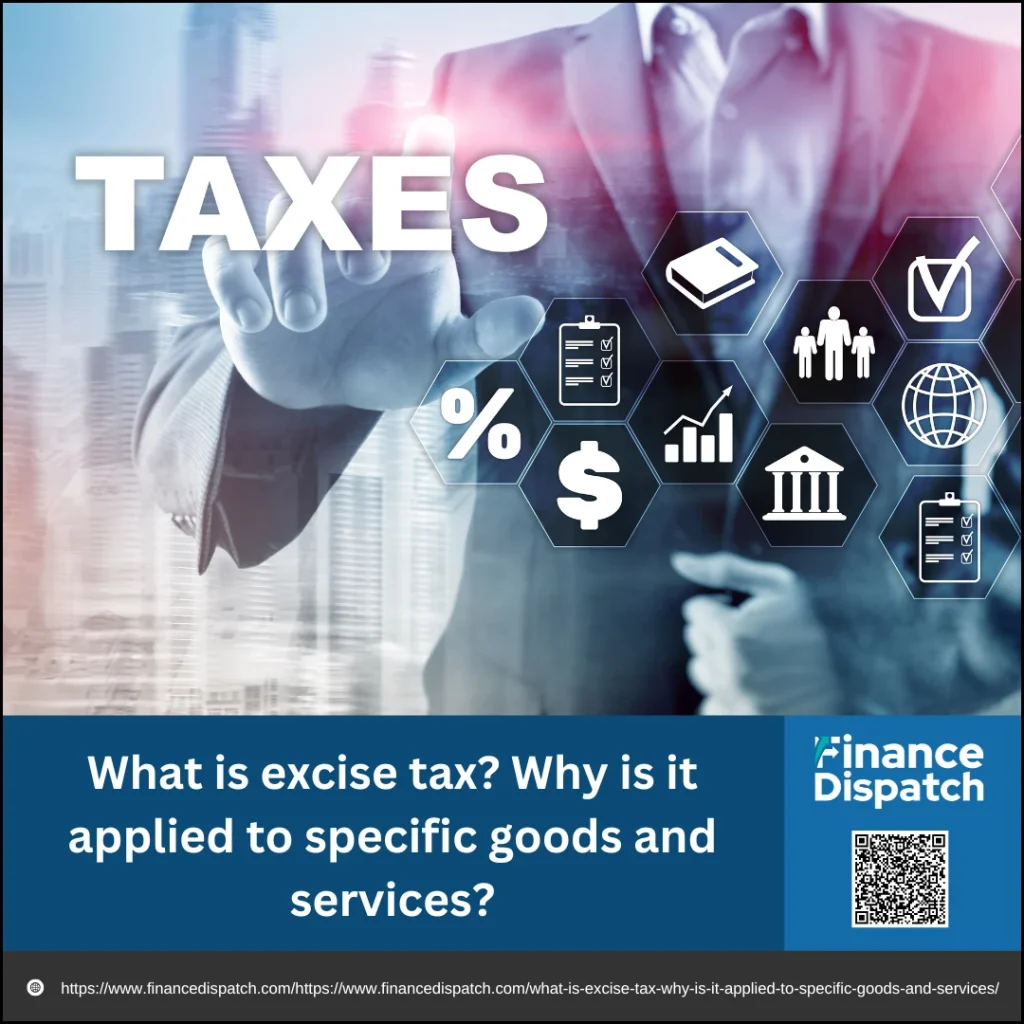Taxes are an essential part of a country’s economy, helping governments generate revenue to fund public services and infrastructure. While most people are familiar with sales tax, fewer understand excise tax, a levy imposed on specific goods and services. Unlike general sales tax, which applies to a wide range of products, excise taxes target particular items—often those with significant social, environmental, or health impacts. These taxes are commonly applied to products such as alcohol, tobacco, gasoline, and luxury goods. Governments use excise taxes not only to raise revenue but also to discourage consumption of harmful or non-essential items, regulate industries, and fund related public projects. In this article, we’ll explore what excise tax is, how it works, and why it is applied to certain goods and services.
What is Excise Tax?
Excise tax is a government-imposed tax on specific goods, services, or activities, often levied at the point of manufacture, sale, or use. Unlike sales tax, which applies broadly to most consumer purchases, excise taxes are targeted at particular products such as alcohol, tobacco, fuel, and luxury items. These taxes can be charged as a fixed amount per unit (specific tax) or as a percentage of the product’s value (ad valorem tax). While businesses or manufacturers typically pay the excise tax directly to the government, they often pass the cost onto consumers by including it in the final price of the product. Excise taxes serve multiple purposes, including generating revenue for public projects, discouraging the consumption of harmful goods, and addressing external costs such as pollution or healthcare burdens caused by certain products.
 How Excise Tax Works
How Excise Tax Works
Excise tax is a specialized tax imposed on certain goods and services, typically at the production, sale, or usage stage. Unlike sales tax, which applies broadly to most consumer transactions, excise taxes are targeted and often built into the product’s price, making them less visible to consumers. These taxes serve multiple purposes, from generating government revenue to discouraging unhealthy or environmentally harmful consumption. Understanding how excise tax works is essential for businesses, consumers, and policymakers.
1. Government Imposes the Tax
The government determines which goods or services are subject to excise tax and sets the tax rate. This can be a fixed dollar amount per unit (specific tax) or a percentage of the product’s value (ad valorem tax).
2. Businesses or Manufacturers Pay the Tax
Excise taxes are typically collected from manufacturers, importers, or distributors rather than from consumers at the point of sale. In some cases, such as fuel taxes, consumers pay directly.
3. Tax Cost is Passed to Consumers
Although businesses are responsible for paying excise taxes, they often include the tax amount in the final price of the product or service, making it a hidden cost for consumers.
4. Excise Tax is Paid to the Government
Businesses must report and remit excise taxes to the appropriate federal, state, or local tax authorities. This is usually done on a quarterly basis through tax forms like IRS Form 720 in the United States.
5. Revenue is Allocated for Public Use
Governments use excise tax revenue for various purposes, including funding infrastructure, healthcare programs, and environmental initiatives. Some excise taxes, like fuel taxes, are directly allocated to road maintenance and public transportation.
6. Consumers May Not See the Tax Directly
Since excise taxes are often built into the price of products, consumers might not realize they are paying them. However, in some cases, such as airline tickets or certain luxury goods, the tax is listed separately on receipts.
7. Excise Tax Rates and Rules Vary
Different countries and states have their own excise tax regulations, which can change frequently. Businesses must stay updated on tax rates, exemptions, and reporting requirements to ensure compliance.
 Common Goods and Services Subject to Excise Tax
Common Goods and Services Subject to Excise Tax
Excise taxes are selectively imposed on specific goods and services, often due to their impact on public health, environmental sustainability, or government infrastructure funding. Unlike sales tax, which applies broadly to most consumer purchases, excise taxes are targeted and often built into the price of products, making them less visible to consumers. These taxes serve multiple purposes, such as discouraging unhealthy behaviors, reducing pollution, funding public programs, and generating government revenue. Excise tax rates vary by country, state, or locality and can be charged as a fixed amount per unit (specific tax) or as a percentage of the product’s value (ad valorem tax). Below are some of the most common goods and services that are subject to excise tax.
1. Alcohol and Tobacco Products
Alcoholic beverages and tobacco products are among the most heavily taxed items worldwide. These excise taxes, often referred to as “sin taxes,” are imposed to reduce excessive consumption due to the well-documented health risks associated with smoking and drinking. In many countries, excise taxes on cigarettes, cigars, vaping products, beer, wine, and spirits are set at both the federal and state levels. These taxes not only raise revenue but also help fund public health programs aimed at treating smoking- and alcohol-related diseases.
2. Fuel and Energy Products
Gasoline, diesel, and other fuels are subject to excise taxes to fund road maintenance, infrastructure projects, and environmental conservation efforts. Some governments also tax coal, electricity, and natural gas as part of their efforts to curb pollution and promote the use of renewable energy sources. Fuel excise taxes are often included in the pump price, making them a hidden tax that consumers pay indirectly.
3. Airline Tickets and Travel Services
Most air travel services are subject to excise tax, which is included in the ticket price. This tax helps fund airport security, air traffic control, and other aviation-related infrastructure. In some cases, international flights carry additional excise taxes to account for cross-border air travel and its environmental impact.
4. Gambling and Lottery Winnings
Governments impose excise taxes on casinos, sports betting, lottery tickets, and online gambling services to regulate the industry and curb gambling addiction. Many countries also tax gambling winnings at a fixed rate. These taxes provide revenue for education, social services, and addiction prevention programs.
5. Luxury Goods and High-End Vehicles
Expensive products, such as high-end cars, private jets, yachts, jewelry, and designer clothing, often carry excise taxes, sometimes called “luxury taxes.” These taxes are imposed on non-essential goods that are primarily purchased by high-income individuals. The goal is to generate additional government revenue while ensuring that wealthier consumers contribute more.
6. Sugary Beverages and Processed Foods
To address rising health concerns related to obesity and diabetes, some governments have introduced excise taxes on sugary drinks, fast food, and highly processed snacks. The idea is to discourage excessive sugar consumption while funding healthcare initiatives. For example, many U.S. cities and European countries have a “soda tax” to reduce the intake of high-calorie beverages.
7. Firearms, Ammunition, and Hunting Equipment
Excise taxes are applied to firearms, ammunition, and hunting equipment to regulate the firearm industry and generate funds for law enforcement, conservation efforts, and public safety initiatives. In the U.S., excise tax revenue from firearms sales helps fund wildlife conservation and habitat restoration programs.
8. Indoor Tanning Services
Due to the health risks associated with artificial tanning, some governments impose excise taxes on indoor tanning services. This tax is intended to reduce the use of tanning beds, which have been linked to an increased risk of skin cancer, particularly melanoma.
9. Telecommunications and Digital Services
Certain telecommunication services, such as mobile phone plans, internet services, and cable TV subscriptions, are subject to excise tax in some jurisdictions. These taxes help fund public broadcasting, emergency communication services, and rural internet expansion projects.
10. Heavy Vehicles and Transportation Services
Large trucks, commercial vehicles, and heavy machinery used on public roads are often taxed to help maintain highways, bridges, and road infrastructure. These excise taxes are crucial for funding transportation improvements and reducing congestion. In some cases, ride-sharing services and rental cars may also be subject to excise taxes.
Types of Excise Taxes
Excise taxes are categorized based on how they are applied to goods and services. Governments use different taxation methods depending on the nature of the product, its impact on society, and revenue generation goals. The two primary types of excise taxes are ad valorem taxes and specific taxes. Ad valorem excise taxes are based on a percentage of the product’s value, meaning higher-priced goods generate more tax revenue. In contrast, specific excise taxes are a fixed amount per unit, regardless of price. Each type serves distinct purposes, from discouraging harmful consumption to funding essential infrastructure. The table below outlines the key differences between these tax types, along with examples.
| Type of Excise Tax | Definition | Examples |
| Ad Valorem Tax | A percentage-based tax applied to the price of a good or service. The more expensive the product, the higher the tax paid. | 10% tax on tanning services, 7.5% tax on airline tickets, 12% tax on heavy trucks |
| Specific Tax | A fixed amount charged per unit of a product, regardless of its price. | $1.01 per pack of cigarettes, $0.183 per gallon of gasoline, $3 per cruise ship passenger |
 Why Governments Levy Excise Taxes
Why Governments Levy Excise Taxes
Governments impose excise taxes for multiple reasons beyond just revenue generation. Unlike general sales taxes, which apply broadly, excise taxes target specific goods and services, often those with negative social, health, or environmental impacts. These taxes serve as a tool to regulate consumption, fund public programs, and address externalities—unintended consequences of certain products that affect society at large. Below are the key reasons why governments levy excise taxes and how they impact businesses and consumers.
1. To Generate Government Revenue
Excise taxes provide a steady source of income for governments. While income tax and corporate taxes are the main revenue generators, excise taxes supplement these by contributing to public budgets without directly taxing wages or business profits.
2. To Discourage Harmful Consumption (“Sin Taxes”)
Governments impose high excise taxes on products like tobacco, alcohol, and sugary drinks to discourage excessive consumption. These “sin taxes” aim to reduce public health risks such as smoking-related diseases, alcohol abuse, and obesity.
3. To Fund Public Health and Welfare Programs
Excise tax revenue from harmful products is often allocated to public health initiatives. For example, cigarette and alcohol taxes may help fund anti-smoking campaigns, addiction treatment programs, and healthcare services.
4. To Maintain and Improve Infrastructure
Taxes on gasoline, diesel, and heavy vehicles directly fund road construction, maintenance, and public transportation. Without fuel excise taxes, governments would struggle to maintain highways, bridges, and transportation networks.
5. To Reduce Environmental Damage
Excise taxes on fossil fuels, carbon emissions, and plastic waste help governments combat climate change and pollution. These taxes incentivize businesses and consumers to adopt cleaner energy alternatives and eco-friendly products.
6. To Regulate Luxury and Non-Essential Goods
High-end products like luxury cars, yachts, and jewelry often carry excise taxes. These taxes ensure that those purchasing non-essential, high-value goods contribute more to public funds.
7. To Manage Gambling and Betting Industries
Governments impose excise taxes on casinos, lottery tickets, and online gambling platforms to regulate the industry and mitigate gambling addiction. Some of this tax revenue is used to support gambling awareness programs and financial aid for problem gamblers.
8. To Ensure Fairness in Trade and Competition
Excise duties on imported goods protect domestic industries by leveling the playing field between local manufacturers and foreign competitors. This helps sustain local jobs and production.
9. To Control Use of Firearms and Ammunition
Excise taxes on firearms and ammunition act as a regulatory measure, making gun ownership more costly and funding law enforcement and public safety programs.
10. To Offset Costs of Certain Services
Some excise taxes, such as those on airline tickets and telecommunications services, help fund security, emergency services, and other essential infrastructure that supports these industries.
Who Pays Excise Tax?
Excise taxes are primarily paid by businesses, manufacturers, and importers rather than directly by consumers. However, the cost of the tax is often passed down to consumers through higher product prices. In most cases, businesses selling excise-taxed goods—such as alcohol, tobacco, gasoline, or airline tickets—are responsible for remitting the tax to the government. While consumers do not directly see these taxes as a separate charge on receipts, they pay for them indirectly through increased costs. In some cases, like airline ticket fees or vehicle registration, excise taxes are clearly listed. Governments may also impose excise duties on imports, requiring importers to pay the tax before selling goods in the domestic market. Ultimately, although businesses are the ones legally obligated to pay excise taxes, consumers bear the financial burden as the tax is embedded into the price of taxed goods and services.
Excise Tax vs. Sales Tax: Key Differences
Excise tax and sales tax are both indirect taxes that impact the final cost of goods and services, but they differ in their application, calculation, and purpose. Sales tax is a broad tax applied as a percentage of the total price of most consumer goods and services at the point of sale. Excise tax, on the other hand, is imposed on specific products like fuel, alcohol, tobacco, and luxury items, often as a fixed amount per unit or a percentage of the product’s value. While sales tax is typically collected from the consumer at checkout, excise tax is usually levied on manufacturers or distributors and included in the product’s price, making it less visible to consumers. The table below highlights the key differences between excise tax and sales tax.
| Criteria | Excise Tax | Sales Tax |
| Scope | Applies only to specific goods and services | Applies to most retail sales |
| Calculation | Can be a fixed amount per unit (specific tax) or a percentage of the product’s value (ad valorem tax) | Always calculated as a percentage of the total sale price |
| Who Pays? | Paid by manufacturers, importers, or distributors (cost passed to consumers) | Paid directly by consumers at checkout |
| Visibility | Often included in the product price (hidden tax) | Clearly itemized on receipts |
| Purpose | Used to regulate industries, discourage harmful consumption, and fund specific government programs | Generates general government revenue without targeting specific behaviors |
| Common Goods Taxed | Fuel, alcohol, tobacco, gambling, luxury goods, airline tickets | Clothing, electronics, furniture, food (varies by state) |
| Government Level | Can be imposed at federal, state, and local levels | Primarily imposed at the state and local levels, not at the federal level in the U.S. |
How Excise Tax is Calculated
Excise tax calculation depends on the type of excise tax being applied—ad valorem (percentage-based) or specific (unit-based). Governments set these taxes based on the product’s value or quantity, and businesses are responsible for including them in pricing. While ad valorem excise taxes are calculated as a percentage of the product’s selling price, specific excise taxes impose a fixed amount per unit, such as per gallon of fuel or per pack of cigarettes. Understanding these calculations is essential for businesses to comply with tax laws and for consumers to recognize how these taxes affect the prices of goods and services. Below are the key steps involved in calculating excise tax.
1. Determine the Type of Excise Tax
Identify whether the tax is an ad valorem tax (percentage-based) or a specific tax (fixed amount per unit).
2. Identify the Applicable Tax Rate
Governments set excise tax rates based on the product category. For example, fuel may have a fixed tax per gallon, while indoor tanning services may have a 10% ad valorem tax.
3. Calculate the Tax for Ad Valorem Excise Taxes
Use the formula:
Excise Tax = Product Price × Tax Rate
Example: If a tanning service costs $50 and has a 10% excise tax, the tax amount is:
$50 × 10% = $5 excise tax
4. Calculate the Tax for Specific Excise Taxes
Use the formula:
Excise Tax = Quantity × Tax Per Unit
Example: If the excise tax on cigarettes is $1.01 per pack, and a retailer sells 500 packs, the total excise tax is:
500 × $1.01 = $505 excise tax
5. Include Excise Tax in the Product Price
Businesses often factor excise tax into the final retail price, passing the cost onto consumers without showing it separately on receipts.
6. Report and Pay the Excise Tax
Businesses must file excise tax returns (such as IRS Form 720 in the U.S.) and submit payments quarterly or as required by law.
Are There Excise Tax Exemptions?
Yes, certain goods, services, and organizations may qualify for excise tax exemptions under specific conditions. Nonprofit organizations, government entities, and certain industries may be exempt from excise taxes if they meet legal requirements. For example, nonprofit educational institutions and government agencies may receive exemptions from telecommunication excise taxes or fuel taxes used for official purposes. Additionally, some businesses can claim excise tax refunds or credits if they use taxed goods for non-taxable purposes, such as fuel used in farming, aviation, or off-road industrial activities. In some cases, imported goods designated for humanitarian aid, research, or diplomatic use may also be exempt from excise duties. To qualify, businesses and organizations must apply for exemptions, maintain proper documentation, and follow specific reporting requirements.
Reporting and Paying Excise Taxes
Businesses that manufacture, sell, or import goods subject to excise taxes are responsible for accurately reporting and paying these taxes to the appropriate government authorities. Since excise taxes are typically levied at the production or distribution level rather than at the point of sale, businesses must track their taxable goods and services carefully. Governments require periodic tax filings, usually on a quarterly basis, and failure to comply with reporting deadlines can result in penalties and fines. Proper documentation and timely payments ensure businesses remain compliant with tax regulations. Below are the key steps involved in reporting and paying excise taxes.
- Determine Taxable Goods and Services – Identify which of your products or services are subject to excise tax based on government tax laws.
- Calculate the Excise Tax Owed – Use the correct method for either ad valorem (percentage-based) or specific (fixed amount per unit) excise taxes.
- File the Required Tax Forms – In the U.S., businesses must file Form 720 (Quarterly Federal Excise Tax Return) with the IRS. Other countries may have similar tax forms.
- Make Timely Payments – Excise taxes are usually due quarterly, semi-monthly, or monthly, depending on the type of tax and government regulations.
- Maintain Detailed Records – Keep documentation of sales, tax calculations, and payments for compliance audits and potential refund claims.
- Claim Exemptions or Refunds (If Applicable) – Some businesses may qualify for excise tax refunds or exemptions if the taxed goods are used for non-taxable purposes (e.g., fuel for farming or aviation).
- Monitor Changes in Tax Rates and Regulations – Excise tax laws can change frequently, so businesses should stay updated on new rates and reporting requirements.
Conclusion
Excise taxes play a significant role in government revenue generation, regulatory enforcement, and public policy. Unlike sales tax, which applies broadly, excise taxes target specific goods and services, often with the intent to discourage harmful consumption, fund public programs, and regulate industries. Businesses that manufacture, sell, or import taxable products must carefully calculate, report, and pay excise taxes to remain compliant with tax laws. Although consumers may not always see these taxes itemized on receipts, they ultimately bear the cost through higher prices. Understanding how excise taxes work, their exemptions, and reporting requirements helps businesses manage their tax obligations effectively while ensuring transparency in pricing. As tax laws continue to evolve, staying informed about changes in excise tax rates, exemptions, and filing procedures is crucial for both businesses and consumers.



